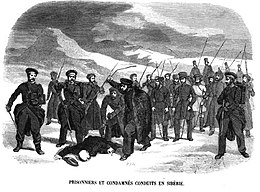

| Part of a series on |
| Immigration |
|---|
 |
| General |
| History and law |
| Social processes |
| Political theories |
| Opposition and reform |
| Causes |
Deportation is the expulsion of a person or group of people from a territory. The actual definition changes depending on the place and context, and it also changes over time.[1][2][3][4] Forced displacement or forced migration of an individual or a group may be caused by deportation, for example ethnic cleansing, and other reasons [which?]. A person who has been deported or is under sentence of deportation is called a deportee.[5]
- ^ "EMN Asylum and Migration Glossary – Removal". European Commission.
- ^ "Case Matrix Network – Art. 7(1)(d) 5". Case Matrix Network.
- ^ "Aliens, Expulsion and Deportation". Oxford Public International Law.
- ^ Jean-Marie Henckaerts in his book Mass Expulsion in Modern International Law and Practice wrote:
See Jean-Marie Henckaerts (1995). Mass Expulsion in Modern International Law and Practice. Martinus Nijhoff Publishers. pp. 5–6. ISBN 90-411-0072-5.As far as deportation is concerned, there is no general feature that clearly sets it apart from expulsion. Both term basically indicate the same phenomenon. ... The only difference seems to be one of preferential use, expulsion being more an international term while deportation is more used in municipal law. ... One study [discusses this distinction] but immediately adds that in modern practice both terms have become interchangeable.
- ^ "Definition of DEPORTEE". www.merriam-webster.com. Retrieved 2021-02-25.